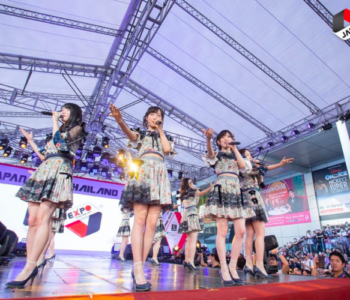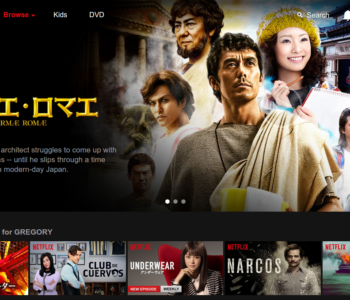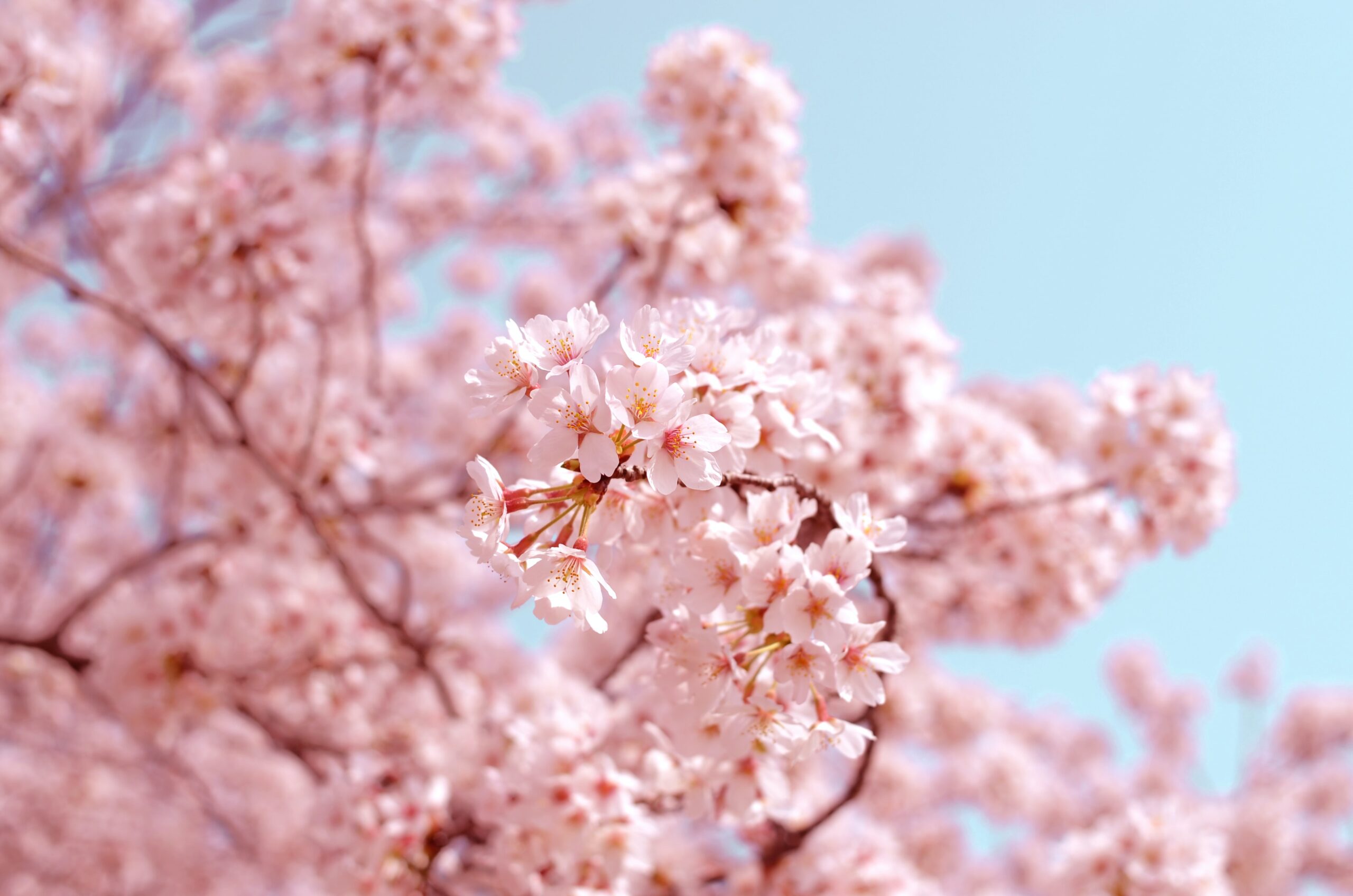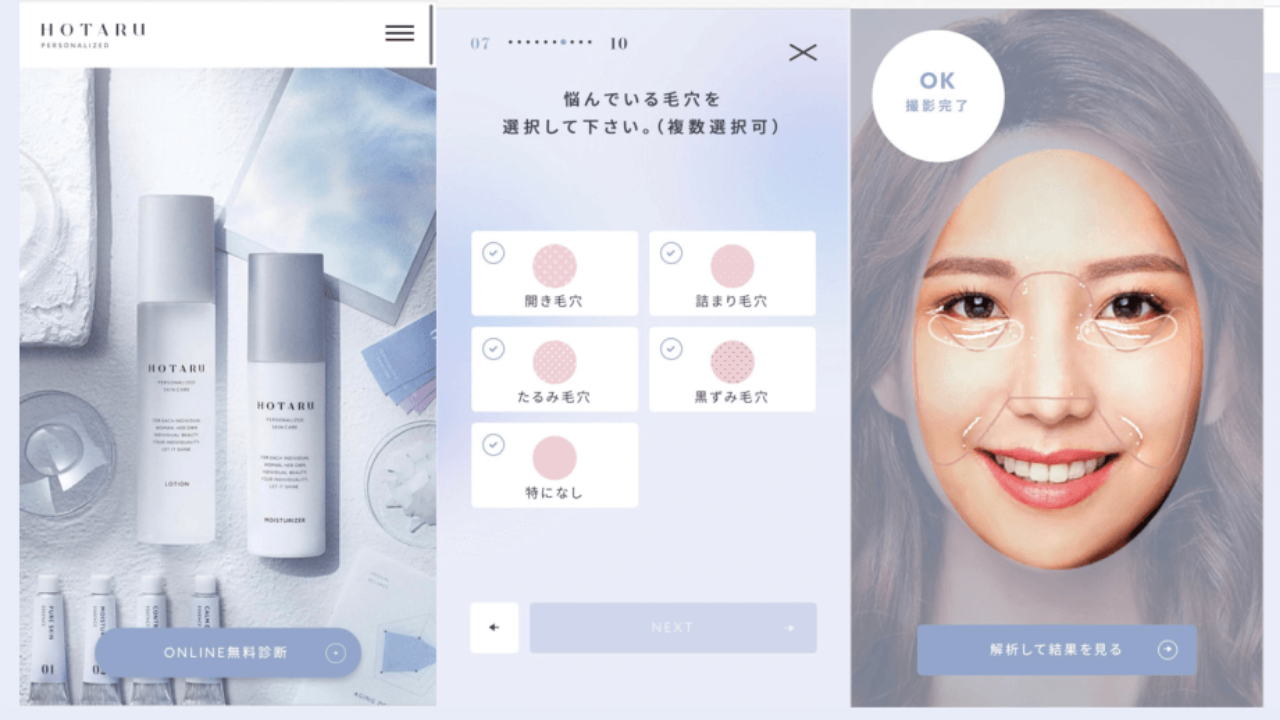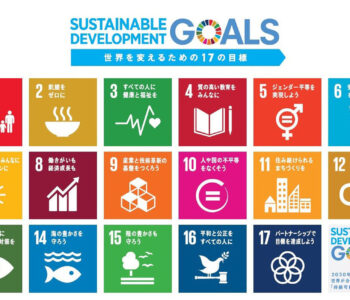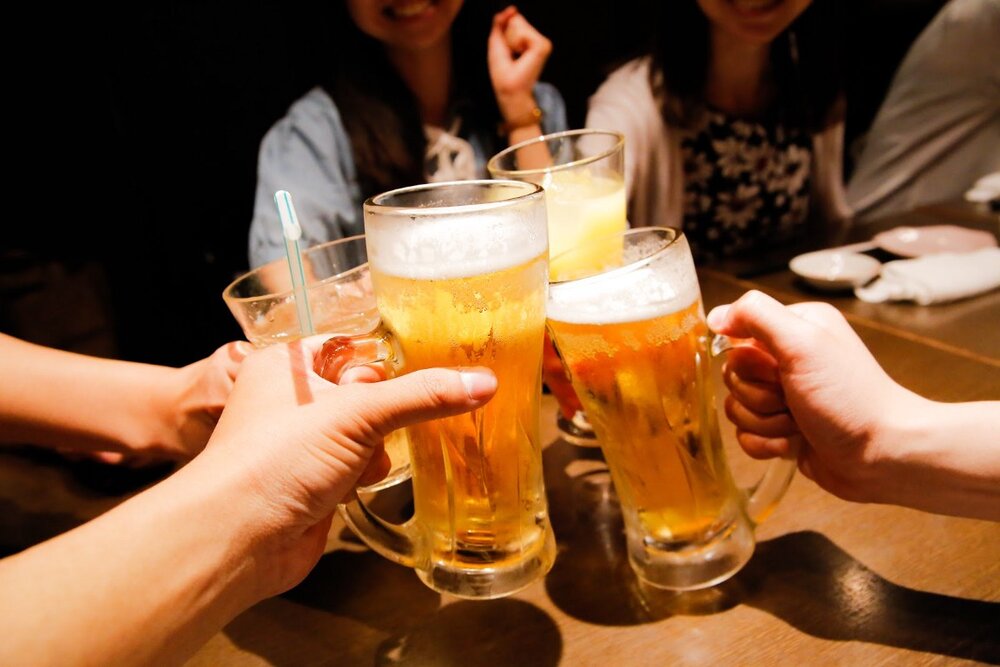 Culture
Culture
Nominication in Japan: What you should know & 5…
By Melissa Francis
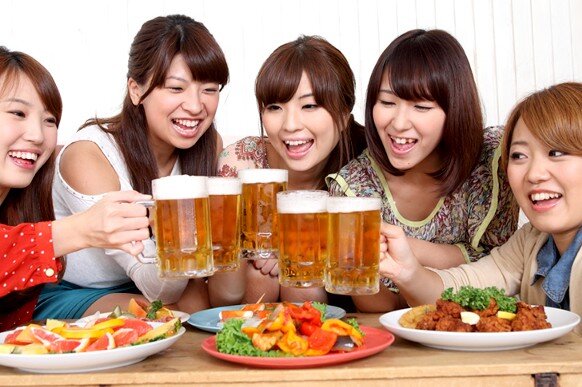
It is important to understand the role of social gatherings in Japan when looking to build on existing relationships with Japanese clients and associates. Nominication is a local word that combines both nomi (drink) and the English loan word ‘communication’. Thus, it refers to the art of communicating and bonding through the process of drinking with others.
Why is drinking culture and nominication so important in Japan?
From a Japanese perspective, drinking is an activity that enables people to share a sense of togetherness and honesty. It has different connotations within professional and social contexts. In business settings, the purpose of nomikai (drinking meets) is to help build closer relationships between colleagues, juniors and superiors, as well as clients. It’s all about deepening bonds. In personal circles on the other hand, these types of gatherings can be great ways to make new acquaintances, strengthen connections between friends, meet others with similar hobbies, or find potential romantic partners.
So what are ‘nominication’ and ‘nomikai’ all about?
Nomikai take place in a more casual settings among colleagues and are primarily focused on drinking, perhaps with some light side dishes to accompany them. These events offer a relaxed space in which to get to know one another better and build up relationships between employees within the same department. These are an especially common way of celebrating the on-boarding of new recruits or if somebody is leaving the company. Attendance at these events is sometimes mandatory. In any case, declining invitations several times may come across as rude and, as a result, that person’s reputation within the company could be adversely affected.
Senior Managers or Directors are often be expected to pay a little extra or cover all related expenses. Usually though, there is a specific budget set aside for company socials, most of which is spent at nomikai. It is considered good etiquette for lower-ranking employees (kouhai) to fill the glasses of their seniors (senpai) with alcohol such as sake first. It is also a general rule that they should wait for someone else to offer to pour their drink, rather than to refill their own cup.
As well as being a key way to deepen bonds, it’s important to understand that there are often rather political reasons for nominication. For instance, if an employee is seeking a promotion, they may try to improve their favourability by accompanying their boss to a nomikai. This is one way to show willing and demonstrate that they are the most suitable candidate.
Public group-based drinking sessions can take place for a number of different reasons and in various contexts. Typically, the first drinking session is followed by a second round, known as a nijikai, at a nearby bar. Sometimes, for those who are really keen to make an impression, this extends even further into the night with a sanjikai (third party).

Notable types of nominication:
Here are five prominent types of nomikai in Japan.
1. Bounenkai (忘年会)
Bounenkai (literally a ‘forget the year party’) is a larger work-based nomikaithan the usual department staff ones. It is celebrated at the end of each year and is attended by employees from across a company to celebrate what they have achieved during the past year, whilst welcoming the next one with good intentions.
2. Settai (接待)
Settai are more formal affairs, involving going out to eat at a restaurant with clients or business associates such as partners at other companies. These often follow a meeting with the main objective of closing a deal. The bill will always be covered by the company carrying out the work for their client.
3. Joshikai (女子会)
Joshikai are nomikai for women only. They are used as a way to improve friendships and share updates on their respective lives. An example might be a group of classmates who attended high school together having a reunion, or several female coworkers. The term joshikai normally refers to young women (aged from their teens to their thirties) drinking and eating together.
4. Goukon (合コン)
Goukon are essentially group matchmaking events. They typically ‘recruit’ an equal number of male and female guests. Throughout the course of the goukon, they get to know one another through drinking and chatting together, swapping contact details with anyone who strikes a chord. Under the surface, these events can be fairly competitive. Participants may try and use slightly out-of-character flattering techniques in order to get to the next stage with their preferred partner. Equally, if another member of the group expresses significant interest in someone, one of the others may back down out of respect. There are also a growing number of goukon and parties catering to the LGBT community, such as ‘LGBT Partners’ — a matchmaking service that organises meets and mingling parties throughout Japan and has a very international feel to it.
5. Soubetsukai (送別会)
This type of drinking meet is a sending-off party specifically designed for teachers and professors who are leaving their position at a school. It is attended by peers working in the same faculty. The purpose is to thank them for their service and wish them the best for their future. Entertainment is often put on by the attendees within the group, and can be anything from a song or dance performance to a comedy sketch.
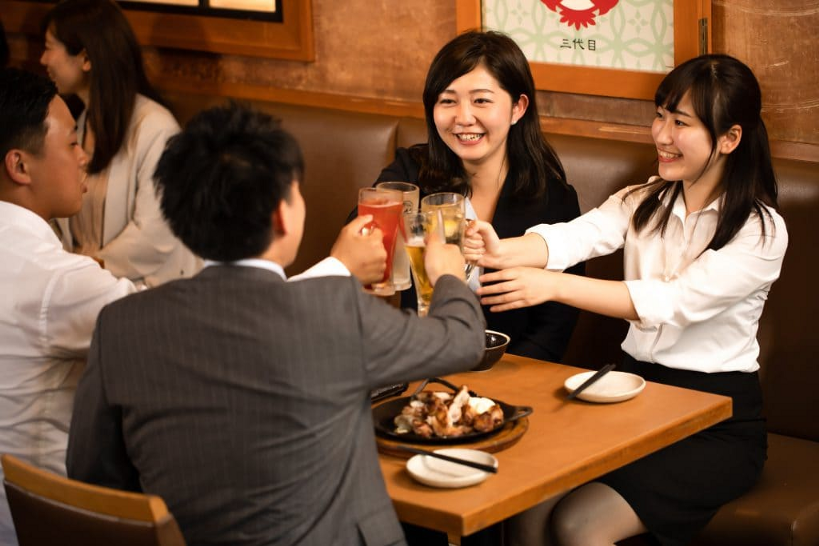
Services that cater to ‘nomikai’ fans
Due to the popularity of nomikai in Japan, there are a number of services that cater towards people looking to attend meetups involving drinking.
One such example is ‘Nomi Tomo’ (which literally translates as ‘drinking friend’), a platform that allows users to search for new acquaintances to join an existing group (perhaps some of the previous participants had dropped out) for a nomikai. Users can list whether they’re seeking out men, women or no preferred gender, and how many they want in order to fill up their group. According to statistics provided by the company, 73% of their users are men and overall 78% are in their 20s and 30s. It’s free to register for the service unless the user wants to send direct messages through the app, in which case they have to pay 1,500 JPY (approximately £10 / €12) for thirty days of access.
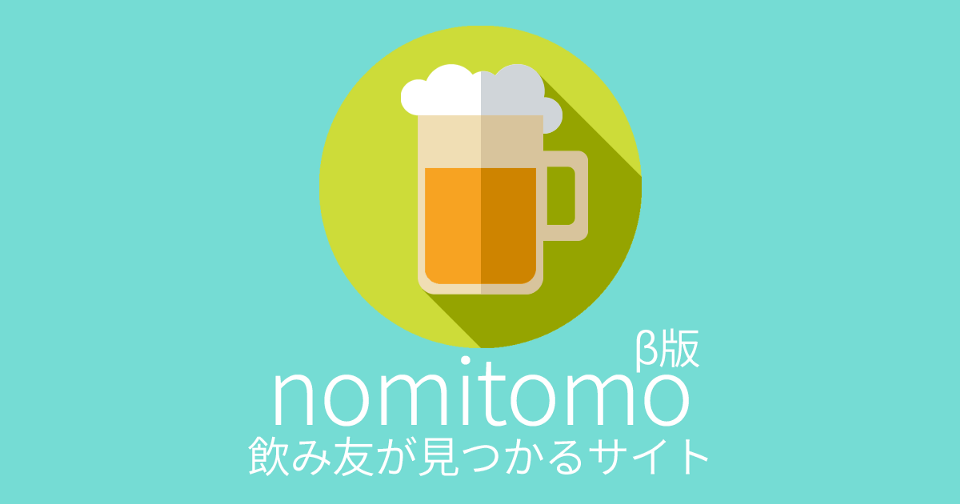
Is Japan’s nominication culture actually dying out?
Despite the key role alcohol has served in strengthening bonds between superiors, subordinates and clients, recent insights from workers point to the fact that in reality, this type of activity is on the decline. In her Quartz article, Natasha Frost suggests that Japan’s post-work drinking phenomenon is experiencing a lapse in popularity. This, in addition to the relaxation of expectations around overtime means that activities once considered to be staples of Japanese workplace culture are moving in a new direction.
What do Japanese people think about this part of their culture?
To draw on the above insights, we interviewed a handful of Japanese professionals working across various industries to understand their thoughts on nominication. Here’s what they said:
In my department, nominication is on the verge of extinction. Especially the after-work style reform (hatarakikata kaikaku), it seems that men in management positions have become overly worried about being accused of sexual or power harassment, so they hesitate to invite their subordinates (of the opposite sex in particular) to hedge the risk. So, in my opinion, both management and subordinates are moving away from nominication.
However, this culture may still remain in other departments like account management or media buying where teamwork is needed. I actually hear that some of my colleagues are suffering as a result of their high-handed bosses. But at least in creative departments, since we usually work individually and do not have to meet with clients like account managers, we do not have nomikai with our colleagues or clients as often as other departments do.
Female, 30s, Advertising Account Executive
I think nomikai are definitely more important among members of the older generation, but younger people don’t place so much importance on attending them nowadays.
Male, 20s, Marketing Consultant
I’m not 100% against the idea of attending nomikai. I understand that socialising is important, but I also do not think it has to be nomikai. I experienced really different cultures within the same company I worked for in Japan.
First of all, I was in a sales position, so it was rather a masculine and tough environment, where we were expected to go to nomikai. It could even continue until the early hours, and I would still be expected to show up at work a few hours later next morning.
My second position was at the headquarters where I was doing more of a desk job. We did have nomikai but we also had lunch time gatherings, where we had lunch and nice desserts together to just casually chat.
Because I personally cannot drink much, I preferred non-nomikai style socials at work when I was in Japan, but settai (for hosting clients) were unavoidable.
— Female, 30s, Project Manager
I’m a sales professional, so I often go out drinking. I personally don’t have an interest in attending drinking socials with my colleagues, and am more likely to go drinking with people from outside the company. In general, I think nomikai represents an important way of allowing Japanese people to express themselves, as their honne (true intention) is not usually asserted in public.
Drinking socials are an important communicational tool in a place like Tokyo, where human relationships are becoming scarce.
— Male, 40s, Software Sales Consultant
Understanding these cultural nuances can support your company in Japan
For Western companies, no matter how much you think you know about Japan, getting to grips with all the differences in the Japanese business culture can be a challenge. But it really doesn’t have to be that way. Nominication and other forms of socialising comprise an important part of business and personal life in Japan. This might seem overly traditional to many of us in the west, but even today in Japan there remains a strong focus on teamwork, celebrating company-wide successes, and treating clients with the kind of hospitality that goes above and beyond.
We can help you ensure any upcoming meetings in Japan flow as naturally as possible, without cultural misunderstandings that could potentially hinder your chances of closing a deal.
